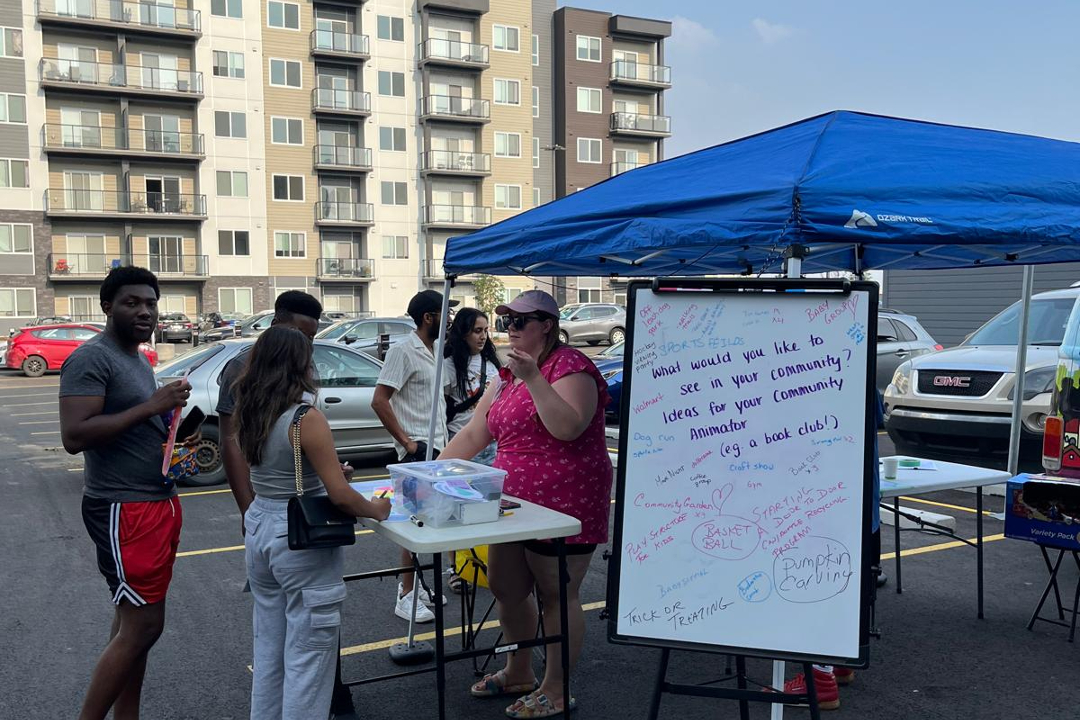A new pilot project that tests if a community animator can build a sense of inclusion at an apartment building where people with developmental disabilities live has already convinced the building owner of its worth.
"In my mind, I already foresee it being a long-term project," Leston Holdings vice-president Dinika Matychuk told Taproot about the Future of Home Inclusive Housing Solutions Lab pilot, which has run at the company's Edgemont Flats building in southwest Edmonton.
Skills Society, a services provider for people with developmental disabilities, and its Action Lab, a creative solutions service for projects, created the Future of Home pilot with partners Civida, Homeward Trust, and Inclusion Alberta.
The pilot's creation involved service providers, architects, and other stakeholders applying human-centred design to re-imagine what affordable, accessible, and socially inclusive housing could look like for people with developmental disabilities.
That work resulted in two prototypes, with the community animator role spun from one of them. The project tests if adding the animator can help the building's neighbours meet and assist one another.
"We're really interested in residents feeling like their house is a home, that they know their neighbours, that they feel safe, and that they have some reciprocal relationships," Rebecca Rubuliak, Skills Society's director of continuous improvement and innovation, told Taproot. "Community often needs to be nurtured. Bringing people together in a space doesn't necessarily result in the deep, reciprocal, natural supports and relationships that support people in thriving in their communities."
Angelika Matson, the community animator, builds connections between residents at Edgemont Flats by getting to know them and introducing people with shared interests. Matson also facilitates neighbourly help and plans events. She is employed by Skills Society for eight hours per week thanks to financial support from Leston Holdings.
Edgemont Flats is a mixed-market apartment building (meaning it has subsidized and unsubsidized units) with more than 300 suites. Clients of Skills Society occupy 12 of the building's suites.
Reports produced from stakeholder feedback on the Future of Home's two prototypes determined there was strong support for housing that mixes people who do and do not have disabilities. Stakeholders also expressed support for having a community animator be responsible for shared spaces in a building.
Rubuliak said it's important that residents feel active in their community. "We have these larger barriers to social inclusion — things like accessibility, affordability," Rubuliak said. "Then there's also some of those softer pieces that the community animator is really tapping into, which are things like helping people to be part of shaping the communities, ensuring that folks' unique gifts, talents, and strengths are part of that, (and) finding ways to support people to be able to contribute and communicate."

Community activator Angelika Matson helps connect residents as a part of a pilot by the Future of Home Inclusive Housing Solutions Lab. (Supplied)
Matychuk said Leston does similar work at its other properties but that it's not as formalized. "Typically, it's the property manager that's trying to facilitate that community engagement," Matychuk said. "But in our experience, that can be a little bit challenging, because if somebody is late on rent or having trouble with guest management ... that might make them less likely to participate in other events or other community engagement — which is the opposite of what they should probably do. The more positive interactions they have, the better."
The Future of Home pilot is ongoing. It was recently recognized at the Service Design Award ceremony in Helsinki, Finland, where it was one of five finalists in the non-profit category.
The project has created free resources on the Future of Home page. There are also lab briefs on the Shared Community Model and Scattered Site Model of housing for people with developmental disabilities.
